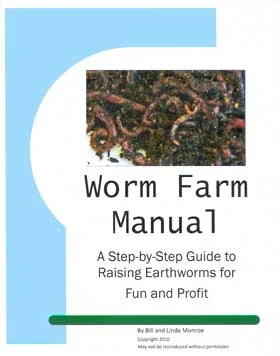The bottom line: Worms do survive cold weather. But there are a few precautions you should take to:
- Keep your worms alive
- Keep your worms active (growing and breeding)
What Happens To Worms In The Winter?
First of all, worms become "dormant" when temperatures fall below 55 degrees. They move around less, breed less, and eat less. Alive but dormant.
When temps fall below 50, worms can go into survival mode. Meaning they just might crawl, creating for you, the worm farmer, a "worm nightmare". More on that later.
When temps fall below freezing and stay there for several days, your worms can die. You must keep your beds from freezing or risk losing your entire worm stock. As you can see, this is one of those "pay attention to your worms" times.
A Nightmare At The Worm Farm
As promised last post, the best way to illustrate the effects of cold weather on your worms and the "nightmare" that can happen is to tell a story from my first worm farming year.
On the first winter of our worm farming career, a cold front moved down early and fast. In one week, we went from record heat to a hard freeze. And it was still October. Folks in Florida aren't used to this kind of stuff, so we were unprepared. At least, as far as the worm farm was concerned.
One day we were worrying about our worms frying, the next day were were trying to put little ear muffs and mittens on our worms. (I know, worms don't have hands or ears. Just making a point.) We had been warned by an old-time worm farmer about the dangers of cold weather, particularly to our worms kept in "holding trays" inside the worm house.
These trays, unlike the outside beds, are more shallow and therefore more at risk in cold weather. The worm house is insulated and has an air conditioner for the summer heat (an absolute must), but we had no heat source.
Thinking we might be okay because of the insulation, we fed and watered the worms, then we went to our own warm beds for the night.
The next morning, when I went down to feed the worms, I opened the worm house door to a scene straight out of a horror story. Worms were literately everywhere. They met me at the door, massed in balls at the door seal. They were crawling in lonely singles up the walls. They were in squirmy balls in all four corners. They were hanging off the sides of the beds.
There were worm clusters under loose pieces of tile flooring. There were individuals worms crawling across the entire floor. There were worm balls huddled here and there and everywhere. Dead and dying worms were all I could see. Everything I looked under had a wad of worms.
The few remaining worms in the beds were compact balls massed at the corners. It was truly a nightmare.
Next....How To Prevent This From Ever Happening Again!On the first winter of our worm farming career, a cold front moved down early and fast. In one week, we went from record heat to a hard freeze. And it was still October. Folks in Florida aren't used to this kind of stuff, so we were unprepared. At least, as far as the worm farm was concerned.
One day we were worrying about our worms frying, the next day were were trying to put little ear muffs and mittens on our worms. (I know, worms don't have hands or ears. Just making a point.) We had been warned by an old-time worm farmer about the dangers of cold weather, particularly to our worms kept in "holding trays" inside the worm house.
These trays, unlike the outside beds, are more shallow and therefore more at risk in cold weather. The worm house is insulated and has an air conditioner for the summer heat (an absolute must), but we had no heat source.
Thinking we might be okay because of the insulation, we fed and watered the worms, then we went to our own warm beds for the night.
The next morning, when I went down to feed the worms, I opened the worm house door to a scene straight out of a horror story. Worms were literately everywhere. They met me at the door, massed in balls at the door seal. They were crawling in lonely singles up the walls. They were in squirmy balls in all four corners. They were hanging off the sides of the beds.
There were worm clusters under loose pieces of tile flooring. There were individuals worms crawling across the entire floor. There were worm balls huddled here and there and everywhere. Dead and dying worms were all I could see. Everything I looked under had a wad of worms.
The few remaining worms in the beds were compact balls massed at the corners. It was truly a nightmare.
Worm Farming Guide
I feel really good that can help others avoid some of the costly mistakes I made when I first started. You'll find other solutions and prevention's for worm farming problems in my Worm Farm Manual.
Increase your profits and make money quicker and easier with this Step-by-Step Guide to growing earthworms. Click here for more information.



